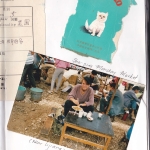The Top 10 of the Top 5 Expat Bloggers – Week 3: KC Blau’s Favorite Austrian Things
“…Cream colored ponies and crisp apple strudels, Doorbells and sleigh bells and Schnitzel with noodles, …” – Sound of Music, My Favorite Things
 “The Five Best Expat Blogs in Austria” bloggers’ favorite things feature continues. During the first week feature, we focused on expat blogger, Kristina Cosumano from the blog, The Practice Room. The second week, we featured of the blog of expat Emily, author and blogger of, A Mommy Abroad
“The Five Best Expat Blogs in Austria” bloggers’ favorite things feature continues. During the first week feature, we focused on expat blogger, Kristina Cosumano from the blog, The Practice Room. The second week, we featured of the blog of expat Emily, author and blogger of, A Mommy Abroad
This week it’s me. Expat Blogger, KC’s Top 10 Favorite Austrian Things
1) Food
Putenschnitzel
hammered, breaded with a slice of lemon on the side and served with parsley potatoes (Petersilerdäpfel), a mixed salad gemischtes Salat) and a Seidel of Ottakringer. Then a Marillenpalatschinken (apricot crepes) with a Melange for desert.
2) Drink
Grüner Veltliner
at the Heuriger Weinhof Zimmermann on a summer evening with a bunch of beloved friends.
3) Film or TV Show
“Liebesg’schichten und Heiratssachen”
(Love and Marriage) Cause I’m a sucker for affairs of the heart and can’t resist rooting for the lonely tuba player from Burgenland who has never had a girlfriend but has an amazing collection of hoola dancing dolls and is looking for love on Austrian national television.
The show is produced by the very talented Austrian documentary maker – Elisabeth Spira (who also did the great “Alltagsgeschichten”) and the production crew is extremely talented at capturing people in their native environments, and finding just the right theme song for the lone wolf as he struts his stuff, nordic walking in the local park or playing catch with his guinea pig. Don’t miss this show – it’s a definite must-see. In fact, the US should consider a spin-off with all the US Eleanor Rigbys out there looking for love.
4) Book
“Das weite Land”
German: Das weite Land: Tragikomödie in fünf Akten (German Edition)
English:
Master of the Deep POV, Arthur Schnitzler :
“Es gibt Herzen, in denen nichts verjährt.” (There are hearts immune from time’s lapses)
***
“Sie fragen mich? Sollt es ihnen noch nicht aufgefallen sein, was für komplizierte Subjekte wir Menschen im Grunde sind. So vieles hat zugleich Raum in uns-! Liebe und Trug …Treue und Treulosigkeit… Anbetung für die eine und Verlangen nach einer anderen oder nach mehreren. Wir versuchen wohl Ordnung in uns zu schaffen, so gut es geht, aber diese Ordnung ist doch nur etwas Künstliches…Das Natürliche…ist das Chaos. Die Seele…ist ein weites Land..”
(You ask me? Have you not noticed, how complicated we humans at heart are. So much has room in us all at once! Love and deception… Loyalty and disloyalty … Worship for one and longing for another or more. We try to create order, insofar as possible, but this order is only generic… The Natural … is chaos. The soul … is a vast land...)
5) Month
May
(with December as a very close second)
I love the month when the city reawakens from its grey winter slumber and every cobblestone, street artist, daffodil and magpie comes to life.
6) Place
On the terrace in summer at exactly 7 pm when the bells of surrounding churches begin to chime and the sun slowly descends
7) Historical Figure
Karl Kraus
sassy and klug, with his clever observations and controversial viewpoints, he certainly knew how to stir things up in the city steadfastly resistant to change .
“War: first, one hopes to win; then one expects the enemy to lose; then, one is satisfied that he too is suffering;
in the end, one is surprised that everyone has lost.”
***
“Everything that’s created remains as it was before it was created. The artist fetches it down from the heavens as a finished thing.”
***
“Language is the mother of thought, not its handmaiden.”
***
“Education is what most receive, many pass on, and few possess.”
***
“In Berlin, things are serious but not hopeless. In Vienna, they are hopeless but not serious.”
8) Tradition / Past time
Krampuslauf
Oh the thrill that someone or something knows that impish side of you and if you don’t behave, will snatch you up and carry you off so you best be careful. Stay away from creatures with Ruten and baskets on or around December 5. And be good.
9) Song
Classical: Mozart‘s Clarinet concerto in A major, K. 622 (25 Mozart Favorites) was written in 1791, shortly before Mozart’s death – maybe I like it so much because for many years I tried my hand at playing clarinet and still have a soft spot for my old instrument despite my own obvious lack of talent.
http://imslp.org/images/f/f6/PMLP03144-2Adagio.mp3
Austropop:
“Shakin My Brain” – Attwenger (see video below) – how can this song not make you laugh?
These guys ingeniously combine drums and an accordion with Upper Austrian dialect to come up with songs with the most inappropriate texts that capture the feeling of life in an Austrian small town. Artsy folky Volksmusik. These guys don’t take themselves too seriously and — I think — are musical geniuses.
10) Word
Oachkatzlschwoaf [‘ɔaxkatzlʃwɔaf] Eichkätzchenschweif – Small oak cat’s tail which is a small squirrel’s tail) – a so-called “Schibboleth” or language test that Austrians love to give to non-Austrians – Germans especially http://www.urbandictionary.com/define.php?term=Oachkatzlschwoaf – if you hang out in Austria long enough, you will eventually be challenged to Oachkatzlschwoaf. You will fail miserably and the Austrians will find this rather hilarious. Be good-humored, laugh along with them, then have a sip of Ottakringer while they recover from their laugh-induced hiccups and challenge them to a “squirrel’s tail” or “Valentine’s day” or “how much wood, would a wood-chuck chuck if a wood chuck could chuck wood.” Who needs to ice-bucket when you can Oachkatzlschwoaf? Below is a little something to help you practice a bit and up your game.
ATTWENGER – SHAKIN MY BRAIN
Fascinating Dissertation by David Kleinberg with more info about Austrian dialect
Shibboleth: According to Judges 12:5-6, the Gileadites captured the fords of the Jordan leading to Ephraim and only the survivors from Ephraim who could properly pronounce “Shibboleth” were spared death. 42,000 didn’t manage. So any word a group uses to distinguish members of that group through the ability to pronounce the word properly (Pittsburghers would fit this as well) is referred to as a “Shibboleth”
ORF – Liebesg’schichten und Heirratssachen (Act now! They are looking for singles as candidates for their 2016 show. Go for it! Show your princess-in-hiding your superior tuba skills)
BBC special about Mozart and the clarinet with music: http://www.bbc.co.uk/programmes/p00bldlh










